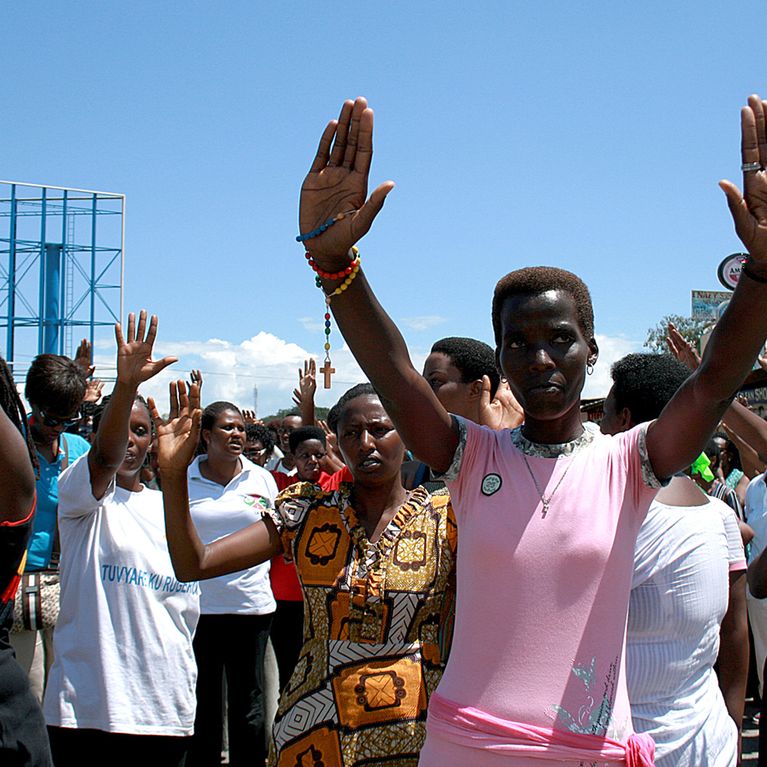
Burundian activist and poet Ketty Nivyabandi has been organizing weekly Black Monday events to denounce the assault on democracy in Burundi. Last May, she said the Burundi crisis was a global crisis of democracy: “Our responsibility as global citizens is to ensure that this doesn’t go on. That this is stopped as soon as possible. Urgently. We need to act urgently.” Instead, the world chose to forget. Looking over the so-called humanitarian summit last month, Burundian activist Marguerite Barankitse noted, “At this summit, nobody is mentioning Burundi. Syrian refugees are a problem for European countries – but Burundians are not a problem immediately. Burundi is far from Europe. But what is ‘far’? It’s a ridiculous word. We are never far. We are from the same humanity.” Burundian women, like Ketty Nivyabandi and Marguerite Barankitse, keep trying to educate us about humanity and democracy. We refuse to listen. This week over 200 students were suspended from school for defacing pictures of Burundi’s president. Earlier in the month, over 300 students were sent home for the same crime. Of the earlier group, eleven were arrested. Six, three boys and three girls, were released because they are minors. This Monday, a court approved the continued incarceration of five … for doodling. We need to act urgently.
What is the danger of the barrel of 500 or so pens in the hands of high school students? Ngūgī wa Thiong’o once noted, in a different context, “A time has come when silence before the crimes of the neocolonial regime in Kenya is collusion with social evil.” That was then, this is now. Why do the major powers not mention Burundi? Silence serves their interests. Police terrorize communities, and little notice is paid. Burundian journalists are forced into exile, and little to no notice is paid. Why? Silence serves the interests of those who actively pay no notice.
And so we are left with poets, such as Rwandan spoken word poet Samantha Teta, who wrote “LUNDI NOIR: poem for Burundian kids”:
Black Monday, Black like the day the jar of your childhood smashed on the floor of your mother’s breaking unity. Black like the day you started packing fear beside your books before you left for school. Black like the day you wore terror beneath your uniform and were feed on hatred when hungry. Black like the day your wings were clipped or tied firmly on your roots of your mother’s agony the day they betrayed her trust. Sweet child it’s another black Monday. Black like the day you started carrying bricks of your breaking land in your belly while you carried food in your memory. Black like the day your lungs inhaled dust heavy with hopelessness and they exhaled your helplessness. Sweet child it’s another black Monday. I know with the degree of fear, loss and grief you have lived with until today has probably forced you to grow up well before your time. I know you will understand what I am about to ask of you. Sweet Child, Think in Color. While Walls continue to tumble around you, allow colorful thoughts like a calm waterfall to soothe your mind. For insistence, think in Red. Red for the color of the fire of desire for freedom that was lit in you the day they put steel around your innocence. Think in Yellow. Yellow for when bananas think they are second to God and bear no good news contrary to their names. Child, bananas are slippery but eventually they rot and are thrown away. Think in Green. Green for life. Nothing lasts forever my dear. Peace, hope and love can be reborn. But they have to be planted and watered within you before they can flourish elsewhere. Think in Purple. Purple the Color of Hope. Hope is neither a happy nor a sad feeling. it’s a flame. No one can put out a flame lit within you. Hope sweetheart will give you the strength to believe in a better tomorrow. Hope will be the light in all this darkness. Hope will give you faith, strength. Think in Blue and White. You may not feel the sun right now but I would like to remind you that it was breed in your skin, sweet child YOU are the Sun. Think of blue and white for clear skies. Clear of the fog of death, don’t worry about the night. You are all the stars your mother needs. Think in Rainbow. Rainbows that come after the rains. Rainbow that has all the colors intertwined into one to make something beautiful. In the same way child, your people are different, they are so diverse but together you make a rainbow. We all do. Learn Unity is powerful, it chases away the heavy rains. It’s okay to be different, powerful to use that difference to build and complement each other. Better days will come, your scars will be the proof of your struggle, little warrior. I wish you never had to fight at all. I wish you had been allowed to be a child. I am sorry that I never could make my pen a sword. Forgive me. (Image Credit: Ketty Nivyabandi)

